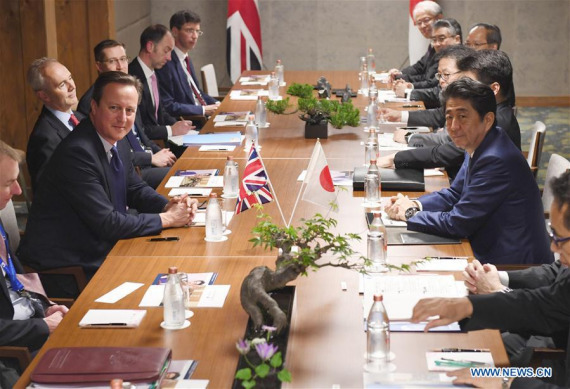
Britain's Prime Minister David Cameron (2nd L) meets with his Japanese counterpart Shinzo Abe (2nd R) at the Shima Kanko Hotel in Shima, Mie Prefecture, Japan, May 25, 2016, ahead of the G7 leaders Ise-Shima summit. (Photo: Xinhua)
Leaders of the Group of Seven (G7) kicked off a summit in Japan on Thursday, but economic policy divergence among the members and protests in Okinawa against U.S. military are expected to shroud the gathering.
Japanese Prime Minister Shinzo Abe invited the leaders to visit the Ise Grand Shrine to demonstrate what he calls the origin of the Japanese culture. However, pundits argued that the agenda violated the constitutional principle of separation of politics and religion.
Abe is accused of reviving the State Shinto, the official ideology of the country known as Imperial Japan from 1868 to 1945, since his return to power in late 2012 and the premier's historical revisionism is also rooted in the ideology.
According to the documents released ahead of the summit, the G7 leaders will discuss ways to drive up global economy, counter terrorism, climate change and energy issues. They will also issue a communique after their two-day meeting.
However, on the economic front, the G7 members are not expected to agree on enlarging public spending to stimulate economy growth because of Germany's caution over finance disciplines. The G7 finance ministers and central bankers also failed to narrow their gaps over the policy in Sendai prior to the leaders' summit.
On Wednesday, over 4,000 Japanese rallied around the U.S Kaneda airbase in Japan's southernmost prefecture of Okinawa against the murder of a local woman by an ex-U.S. Marine Corps. U.S. President Barack Obama arrived in Japan for the G7 leaders' summit late Wednesday.
Abe and Obama held a meeting Wednesday night on the issue, with the U.S. president extending "deepest regrets" over the murder.
Criminal cases involving U.S. soldiers repeatedly happened in Okinawa. A U.S. Navy sailor was arrested in March after raping a woman in a hotel in Naha City, the capital of Okinawa. In 1995, an elementary schoolgirl was savagely gang-raped by three U.S. servicemen.
Obama is also planned to visit Hiroshima on Friday accompanied by Abe, marking the first sitting U.S. president to visit the city that was obliterated by U.S. atomic bombing at the end of World War II.
The United States dropped an atomic bomb over Hiroshima, a stronghold of Japanese Imperial Army and arsenal in 1945 so as to accelerate the end of WWII which was partially waged by Japan.
The Japanese government frequently uses Hiroshima to pose itself as a victim of the war but seldom mention its wartime atrocities in its invasion against Asian neighbors.
Outreaching meetings will be also held alongside the G7 summit, focusing on issues related to development and health on Saturday.


















































